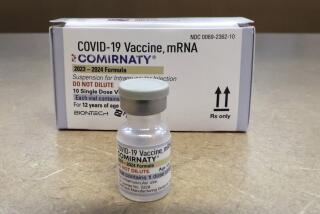Group Breaks Precedent, Recommends Vitamins
- Share via
WASHINGTON — The National Academy of Sciences recommended for the first time Tuesday that large segments of the population take vitamins.
All women of childbearing age should take a daily folic acid supplement to cut the risk of serious birth defects, and all older adults should take daily vitamin B12 supplements to guard against anemia, the academy recommended.
Although both vitamins are available naturally in foods, the academy took this step because even people who eat a well-balanced diet might have difficulty getting all the nutrients they need from food alone.
“For women to meet the daily recommendation for folate, they would have to eat a loaf of bread a day,” said Godfrey P. Oakley Jr., director of the division of birth defects and developmental disabilities at the federal Centers for Disease Control and Prevention.
Although most standard multivitamins contain enough folic acid to meet the recommended daily intake of 400 micrograms, not all contain enough vitamin B12 to meet the needs of those over age 50--2.4 micrograms per day.
The revised recommendations are part of an ongoing overhaul of the well-known “recommended dietary allowances.” The recommendations, now called dietary reference intakes, serve as the basis for a healthy diet.
Last fall, the academy called for many children and older women to eat more foods rich in calcium as a way to protect bones. But this is the first set of recommendations that calls for people to take vitamins to get the nutrients they need.
“This is truly a landmark recommendation because in the past there has been such a bias against recommending supplements,” said Bonnie Liebman, director of nutrition for the Center for Science in the Public Interest, a Washington-based consumer group.
Vitamin supplements are the best way for people 51 and older to be sure that they consume enough vitamin B12, according to the recommendations. Between 10% and 30% of older people lose their ability to absorb vitamin B12 from food, which can cause anemia, a chronic condition that can result in serious health problems.






